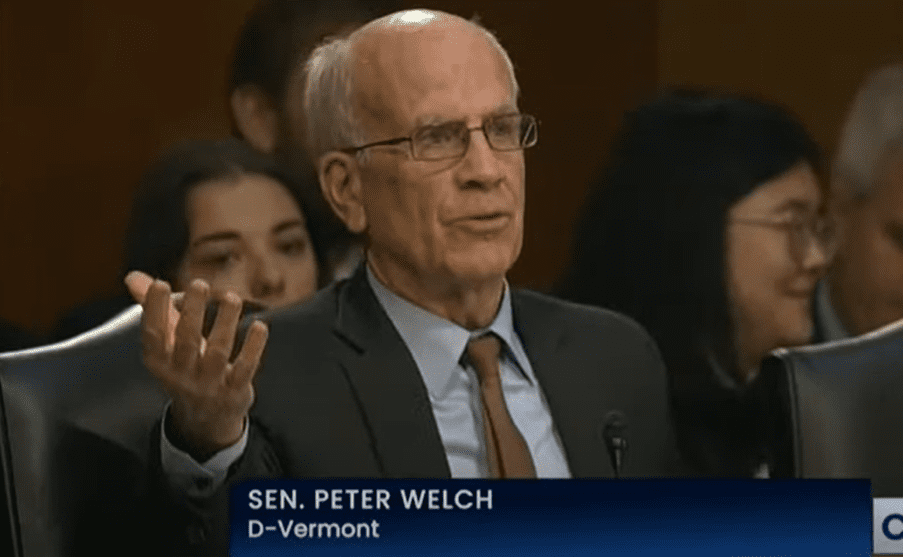WASHINGTON, D.C. – U.S. Senator Peter Welch (D-Vt.) today questioned Brooke Rollins, President Trump’s nominee to be the Secretary of the United States Department of Agriculture (USDA), about several Vermont-focused concerns in her nomination hearing before the Senate Agriculture Committee. Senator Welch questioned Ms. Rollins on the importance of rural development, expanding legal pathways to citizenship to support rural communities, support for Vermont’s dairy industry, building out broadband, and making farms and rural communities more resilient to climate change and extreme weather.
Senator Welch also discussed the fantastic work USDA-Rural Development has done in Vermont to support flood recovery following the July 2023 and July 2024 floods.
“Rural America really is about the great values and strength of America: hard work, family, community. And rural America’s been under brutal pressure, and I think every single one of us wants to do everything we can to strengthen it, because a strong rural America is a strong America,” said Senator Welch.
Watch the exchange between Senator Welch and Secretary of Agriculture Nominee Brooke Rollins:

Read selections of the exchange below:
Senator Welch asked Secretary of Agriculture Nominee Rollins: “We have been really blessed in Vermont with a very responsive Department of Agriculture. The Rural Development organization in Vermont has helped us through the floods of July ‘23 and July ‘24; it has used opportunities to strengthen the economy for farmers. So, I just want to make certain that some of the things that have really been helpful to us, we can have some confidence will continue, should you be the new Secretary of Agriculture.
“I want to make certain that I can have some confidence that our farmers who are adopting regenerative agricultural practices—organic agriculture, are doing things that by all estimations make for good healthy crops—but also reduce carbon emissions that will continue to make that possible. And they’ll get paid to do it, not just be asked through regulations—to bear the burden.”
Brooke Rollins, Secretary of Agriculture Nominee replied: “We actually talked about the workforce at USDA, at least those that you have interacted with and worked with. And hearing from you how excellent the service was, and the good job that they did, meant a lot to me…I think it’s important to recognize, Senator, I will always have an open dialogue with all of you.”
Sen. Welch continued: “Another issue is labor on the farm—we can’t milk our cows. Literally can’t milk our cows without immigrant labor. And I’m for a secure border, I think all of us here are, but I’m also for legal immigration. And that is a real challenge for our dairy farmers. I want to make sure that whatever we do to secure the border doesn’t deprive our hardworking dairy farms and farmers access to the labor that they absolutely depend on…So, we will work together on that? And you appreciate the importance of having access to that labor for our dairy farms and others as well?”
Ms. Rollins: “I know there is great concern amongst our ag community on what immigration under President Trump will look like. My commitment to you is this: that understanding the data and understanding the impact of those in the ag community—dairy farms I think especially are concerned—but everybody is…I know these cows need to be milked 24 hours a day, 7 days a week, it doesn’t go away. If there’s no one to milk them, that’s big trouble.”
Sen. Welch asked: “A lot of the incredible challenges farmers have are because they don’t control the weather. And a lot of our small farmers, our vegetable farmers, they don’t have an insurance program that works for them…I’ve introduced the WEATHER Act as an effort to try to streamline the reporting requirements…we have to have insurance programs that help not just the big commodities…but the smaller farmers that are the future. Can I count on working with you on that?”
Ms. Rollins replied: “Yes, you and I will absolutely work together on that.”
Sen. Welch: “Another issue for young farmers—it’s so hard for a young person to get into farming, and largely because they can’t get the farmland…And you know who’s buying it up? It’s private equity. I want farmers to be able to buy farmland. Is that of concern to you?”
Ms. Rollins: “The average farmer today…is 58 years old. If we really think we’re going to have a sustainable, thriving ag community in 20 or 30 or 50 years…then we have to reverse that trend.”
Sen. Welch continued: “Rural broadband has made such a difference for rural Vermont and for our farm communities. And your department has played a major role in facilitating that. We have to continue that and get that last barn on the longest dirt road wired so they have the advantages that come with access to the internet.”
Ms. Rollins: “100% agree.”
###
